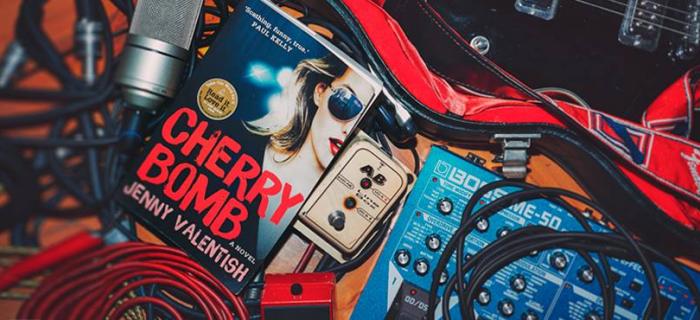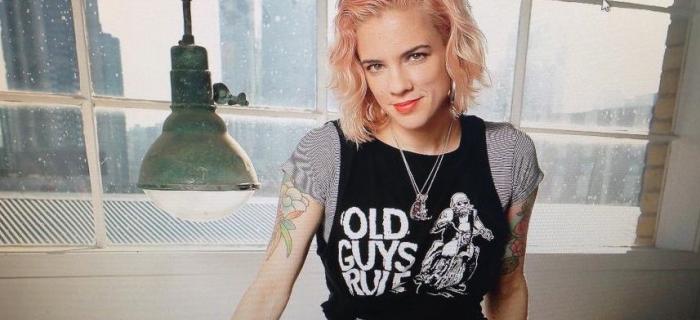Jenny, your first novel ‘Cherry Bomb’ is about to be published in Bulgaria. Tell us briefly how you decided to write it and what it is about.
Cherry Bomb follows the sharp rise and plummet of a teenage band, The Dolls, as they get a record deal years before they’re equipped to handle it. The two frontwomen, Nina and Rose, are cousins, and are locked into a competitive battle. This is made more intense by the fact that they’ve had very different childhoods.
I’ve worked in the music industry for 20 years, first as a publicist, then as a journalist, and my husband is a tour manager. So for every scene in Cherry Bomb I’m drawing on some real scenario I’ve seen.
‘Cherry Bomb’ is pretty much focused on the music industry in Australia and the US. As a music journalist you obviously have a deep insight into this world. How was the novel accepted in these particular circles?
I was extremely cheeky: a few of the characters were based on real figures in the music industry. One of them – the CEO of the girls’ record label – acknowledged it must be based on him and said gruffly, “I admire people who take a risk.”
I sent a draft of the book to four big musicians in Australia who have been in the industry a long time. They read it and gave me quotes for the cover – and they found it to be genuinely fly-on-the-wall.
The protagonist, Nina Dall, is a fierce character and a rather unreliable narrator. Somebody had said that she is not exactly a person you want to come across in real life. How did you create this character where talent and trouble go hand in hand?
Don’t you find the most poignant, most interesting artists have a mental illness, an addiction or both? Nina is a self-sabotaging character, so my rule of thumb was that any good situation she found herself in, she had to mess up somehow. The flipside is that gives her lots of material with which to write tragic songs.
Nina and Rose are the product of our times and they seem to be obsessed with their image. What do you think, does image nowadays prevail over music?
Yeah, they’ve grown up with social media, and Nina gives the reader a tutorial on how to angle their body in photo shoots, what camera to use for selfies, etc. I feel sorry for young bands who feel obliged to be available on social media all the time. It kills the mystique!
This is the first novel with a soundtrack that we publish. Did you compile the soundtrack as you were writing or later?
As I was writing it. The topic of the song tends to fit whatever disaster is happening to the band in that chapter. And more often than not the artist influenced one of the characters.
If the ‘Dolls’ really existed, which real artist or band would they be like? Who has that teenage wild streak on the modern stage?
Well, the title Cherry Bomb is named after a Runaways song. The Runaways were fifteen when they started riffing, shagging and pill-popping their way around the world. The book is set in the current day, but also has a nod back to the 1990s and the fierce bands such as L7, Babes in Toyland and Hole, who really weren’t afraid to say what they thought. Nina and Rose are also based on a current band, but I’ll take their identity with me to the grave.
Most Bulgarian readers would be surprised to discover that Australia has its own country music scene. Here, country music is always perceived of as coming from America. In your novel, country music is at the core of Australian tradition. Is it really the antidote to urban life and culture?
For a second I read that as Bulgaria has its own country music scene and my mind was blown. Yes, Australia has one that used to be uniquely Australian – it was highly romantic folklore about the ‘bush’ and doing it tough. In recent years it has become very homogenised and Americanised – and mainly about having a good time – but there are still a few artists carrying the torch for ‘proper country’.
So, where do you think the ‘Dolls’ are heading at the end of the novel? Are they going to ride the wave of success or will they crash on the rocks?
Oh, they’d continue to be a car wreck for a while before exploding. Our protagonist, Nina, will definitely steer them off a cliff sooner or later. If I ever write a sequel, I’d like them going on tour supporting their aunt, who was big in the 1980s and about to hit the lucrative comeback trail. She was much more of a hellraiser than The Dolls could ever hope to be.
And where are you heading to in 2016? Are you working on a new novel?
I’m glad you asked that, Diana. I’m writing a non-fiction book on women, drugs and alcohol. I’m traveling around to rehabs and universities, meeting experts on the topic. I’m afraid I consider myself to be one, too…
I’m tempted after this to write another music ‘novel’. My husband sees way more freaky things when taking bands on tour than I have seen as a journalist, and I’ve been collecting his stories.
Finally, what do you know about Bulgaria? Any impressions, images, associations that come first to your head…
I love the Bulgarian State Radio & Television Female Vocal Choir – they’re on my iPod. Australia’s roots performer John Butler is part-Bulgarian and named one album April Uprising. And who could forget Great Uncle Bulgaria in Paddington Bear. Bulgarians shake their heads to mean 'yes' and nod for 'no' and drive extremely fast.
Thank you for publishing me in Bulgaria!


